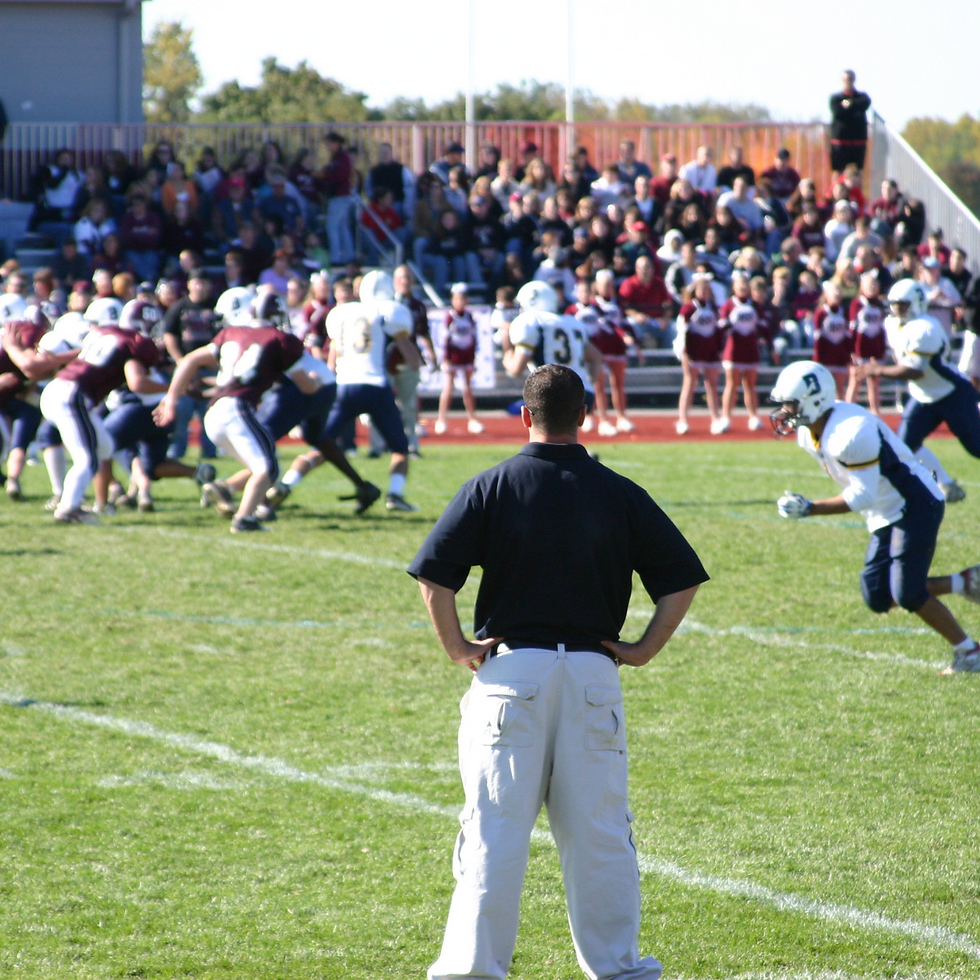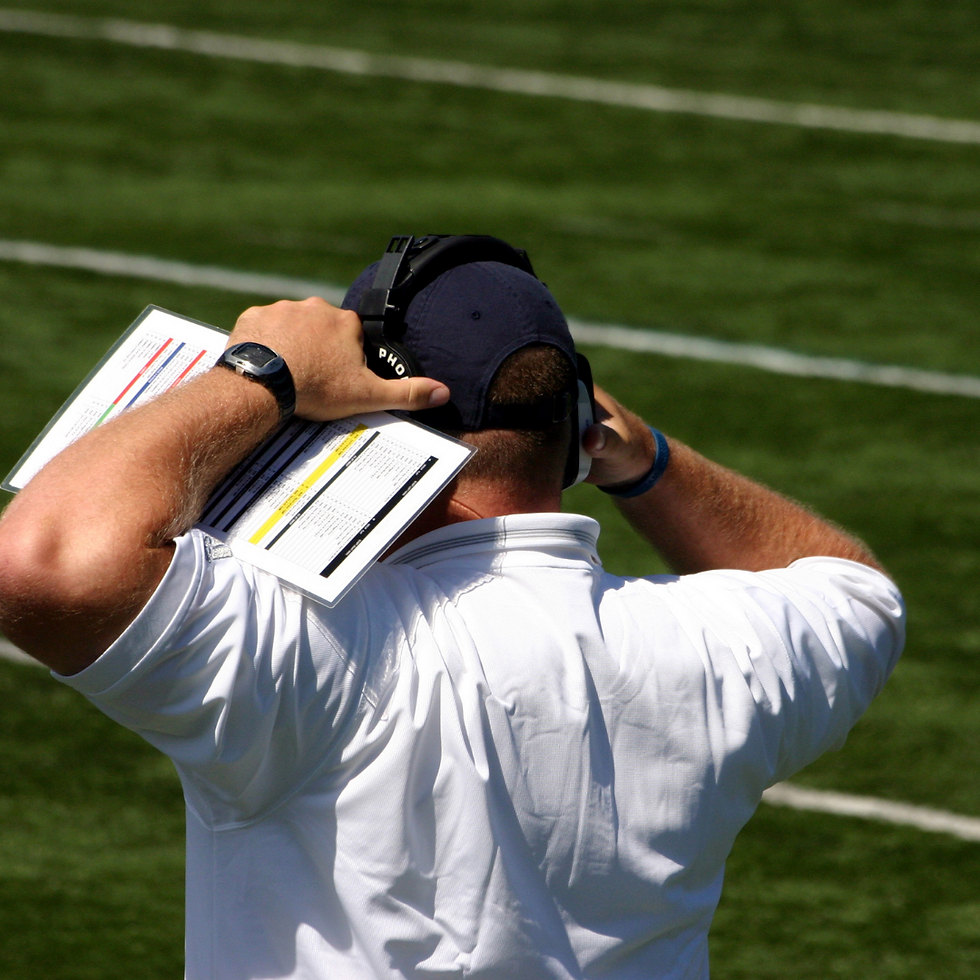Football Coaching Etiquette (Thoughts after Mizzou vs Florida Game)
- Rick Jones
- Nov 9, 2020
- 6 min read
Dear High School Football Coaches,
I hope/expect you are well and healthy. In these crazy times, some of you are finished, some of you in the last week of the regular season, some of you are getting ready for the play-offs, and some of you haven’t yet started. There should be another word in the English language for the most extreme form of crazy, to describe our coaching world today. Whenever we get to play we must do our best to promote the game of football at every opportunity.
I’m sure most, if not all of you, either saw or heard about the altercation we had with Florida on Saturday. Since he first arrived at Mizzou, Coach Drinkwitz has been very clear about his expectations concerning how he wants our team to play the game of football. Saturday night will serve as a great learning experience for our team. I thought that it would be an appropriate time to talk about what I would call coaching “etiquette”. Below are a few ideas that I have come to believe after more than 40 years as a coach.
Disclaimer: I speak only for myself and my experiences, I am not saying this is what WE believe or what YOU should believe.

1. It is our job as coaches to defuse, not escalate when a problem arises. Coach Drinkwitz asked all of the staff today, “Did your actions Saturday night defuse or escalate the problem?” It is our responsibility to defuse those volatile situations. I did not understand, when I was a young head coach, that my visible actions towards the other team or towards the officials could be a factor in firing up or calming down our team and our crowd. If the head coach loses his composure, should we expect 15-18 year old players to keep theirs?
2. We respect and understand the fact that our opponent’s coach has his own problems to deal with. We will be slow to judge the actions or reactions of our opposing coaches. In all the years that I have coached, its just a fact that I have very few enemies in the coaching business. I would like to think that number is below 1; however, that’s a lot of years and a lot of coaches. I could name you some guys that were not my favorites, but I never felt ill will nor animosity towards them. We all know that there are some guys out there that are more fun to beat than others; however, we all realize that coaching is hard. Most coaches care about their kids and their program. Many coaches are struggling with difficult situations and unrealistic parental expectations. Friends, we are all in this together. We need to support each other as much as we can. To me, one of the best ways I can support my fellow coach is to treat him, his staff, and his team, with respect.

3. It is OUR job to worry and concern ourselves with OUR team. It is the opposition coaches’ job to concern themselves with their team. We can’t control the opposition, so we will not waste time and energy worrying about our opponents. What happens on a football field can be random; but, our response is never random, it is 100% our responsibility. I think it very important that if things do get out of hand, we focus as much as humanly possible on our team. We should avoid putting our hands on an opposing player. We keep ours out of the trouble and the opposing coaches keep theirs out of the trouble.

4. I think it is important to not talk to an opposing player before a game. There have been many instances where I knew a player from the other team. I might have said a few words to them; however, I just think that I should hold my comments and conversations with opposing players until after the game. I should NEVER talk to an opposing player during the game, period. I just don’t want to get misquoted or appear to be messing with our opponent’s players. To be honest, I don’t want opposing coaches talking to our players before the game. Why would I do something, that when its done to me, makes me uncomfortable? I am looking forward to our game with Arkansas this year because I have a couple of Greenwood High School kids that play for the Razorbacks. Even though I’ve known these kids since they were in grade school, I’ll still wait to visit with them until after the game. I just think it is the right thing to do. They have a job to do and I have a job to do.
5. I believe it is bad sportsmanship to “run up the score” against an outmanned opponent; however, your definition and my definition of running up the score might be very different. When I was a first year head coach, I pulled our starters out late in the 3rd quarter when we were up 28-0(back in the old days, that was a pretty decent lead). When the score got to 28-14, I put the starters back in. They weren’t ready to play and we barely won, 28-21. Because of the point differential, we lost home field advantage in the playoffs because of my mistake. If we can, we will score one more time than the opponent might think necessary. I honestly don’t think about running up the score as much as I think about how badly it would hurt our team if one of our starters got hurt after the game had already been decided.

On several occasions, we have taken a knee close to the goal line to keep from running up the score or told the wing official to throw his flag if we scored again. The results have been mixed. One coach called me a jerk because he thought we were trying to embarrass his team by taking a knee. Another coach thanked me profusely for the same gesture. If you have a question about this, refer back to number 2 on this list.
I heard a story about Bobby Bowden, when he was coaching at Florida State, that I can’t prove to be true. His Florida State’s team beat a young head coach at a smaller school about 60 points. After the game, the young coach said something about Coach Bowden showing no class. Coach Bowden responded, “Young man, it is not MY job to keep the score close.”
I think at the junior high and high school level, we should be thoughtful towards our opponents, but our team is our responsibility. Just as important to remember is that the other coaches’ team is his responsibility. We are going to focus on US and respect the fact that you will focus on YOU.
I respect the fact that every coach will have his own philosophy about how he does things in his program, including things like running up the score. I remember playing Lawton High School in Lawton, Oklahoma, back in the late 1980’s. I was talking to their coach before the game and asked him what did the saying on their helmets mean? Every Lawton player had the words “EL Deguello” on the side of their helmets. He told me that when Santa Anna surrounded the Alamo, and the Texans refused their opportunity to surrender, basically signing their own death warrants, that Santa Anna made the band play the song, “El Dequello”, which basically means “no quarter asked, no quarter given”, or “slit throat”. I looked at Coach Ahlschlager and said “Coach, what does that mean to me?” He looked at me and said, “Coach, if we can beat you a 100, we’re going to try to beat you a 100”. “Our starters will play the entire game.” It was my first glimpse into what those brave Texans must have felt when they heard the band play that song on their last day at the Alamo. Lawton had an NFL Hall of Famer at guard, a 7-year NFL running back, a 9 year NFL corner / safety, and their quarterback played catcher in the MLB for 14 years. I was determined to fight to the end and to keep it under 99.
As always, I appreciate any feedback or comments. If there is something we can do to help you, let us know. Go Tigers! Beat Georgia!



Comments